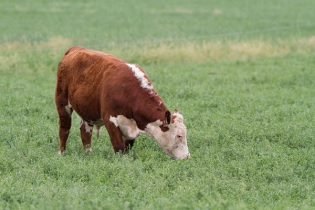
Agricultural News
Plan to Feed Mineral Supplements This Spring to Prevent Grass Tetany in Cattle
Tue, 27 Sep 2016 09:42:15 CDT
 Dr. Glenn Selk, Oklahoma State University Emeritus Extension Animal Scientist, offers herd health advice as part of the weekly series known as the "Cow Calf Corner" published electronically by Dr. Peel and Dr. Glenn Selk. Today, Dr. Selk explains the benefits of feeding mineral supplements in the spring to help reduce the risk of grass tetany in your herd.
Dr. Glenn Selk, Oklahoma State University Emeritus Extension Animal Scientist, offers herd health advice as part of the weekly series known as the "Cow Calf Corner" published electronically by Dr. Peel and Dr. Glenn Selk. Today, Dr. Selk explains the benefits of feeding mineral supplements in the spring to help reduce the risk of grass tetany in your herd.
"Much of Oklahoma and the Southern Plains will have wheat pasture to utilize as winter feed for stocker cattle, replacement heifers, and in some cases for adult cows. At, and after calving time next January, February, and March "grass tetany" could occur in a few situations.
"Grass tetany, caused by magnesium deficiency does not seem to be a major problem in Oklahoma although occasional cases are reported. It typically occurs in beef cows during early lactation and is more prevalent in older cows. The reason older cows are thought to be vulnerable is due to the fact that they are less able to mobilize magnesium reserves from the bones than are younger cows. Grass tetany most frequently occurs when cattle are grazing lush immature grasses or small grains pastures and tends to be more prevalent during periods of cloudy weather. Symptoms include incoordination, salivation, excitability (aggressive behavior towards humans) and, in final stages, tetany, convulsions and death.
"It is known that factors other than simply the magnesium content of the forage can increase the probability of grass tetany. High levels of potassium in forages can decrease absorption of magnesium and most lush, immature forages are high in potassium. High levels of nitrogen fertilization have also been shown to increase the incidence of tetany although feeding protein supplements has not. Other factors such as the presence of certain organic acids in tetany-causing forages have been linked with tetany. It is likely that a combination of factors, all related to characteristics of lush forage are involved.
"When conditions for occurrence of tetany are suspected, cows should be provided mineral mixes containing 12 to 15 percent magnesium and be consumed at 3 to 4 ounces per day. It is best for the supplements to be started a couple of months ahead of the period of tetany danger so that proper intake can be established. Because tetany can also occur when calcium is low, calcium supplementation should also be included. Symptoms of tetany from deficiencies of both minerals are indistinguishable without blood tests and the treatment consists of intravenous injections of calcium and magnesium gluconate, which supplies both minerals.
"Cows grazing lush small grain pastures should be fed mineral mixes containing both calcium and magnesium. Learn more about mineral nutrition of grazing cattle by downloading and reading the Oklahoma State University Extension Circular E-861 Vitamin and Mineral Nutrition of Grazing Cattle."
WebReadyTM Powered by WireReady® NSI
Top Agricultural News
More Headlines...




















